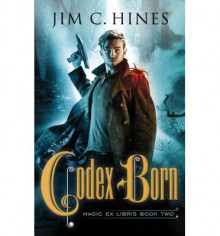
All I can think of is the Goblin King in Labyrinth: “Such a pity.” Creative ideas, a streamlined plot, a love of books–all are fabulous ideas, and all undermined by cumbersome execution. I really want to like this series–I like Jim Hines‘ public persona, I really do, particularly his willingness to be an advocate against rape and rape culture. I haven’t yet read his Goblin King series, but I suspect his strength might be in the YA genre (as well as non-fiction, given his blogging and journalism), because barring a detailed sex scene, this would be satisfactory young adult fare. As an adult genre book, I was too bothered by a lack of polish and sophistication to enjoy it.
Particular to fantasy is the concept of world-building, familiarizing the reader with the world rules of the imaginary. In this case, the introduction to the Libromancer world is muddled; in attempting to avoid the common hazard of info-dumping, orientation to the world starts with a conventional teach-the-student introduction with a twist– a new student trying to teach Issac how to use an e-reader. Within pages, they are called to a case, which progresses into Issac giving his relationship status to an unfamiliar werewolf, and then his professional updates to a psychologist friend. I almost suspect that a quick info-dump would have been more succinct and clear, instead of these stilted conversations and references that the reader is left trying to put together into a whole.
Narrative is first person, alternating between Issac, Libriomancer and magic researcher, and Lena, the spunky dryad. Issac’s sections initially focus on solving a couple of mysterious wendigo deaths, but soon evolve into self defense as he and Lena are attacked by mysterious metallic insects. Lena’s narratives are about her life before Issac, spanning over fifty years from her creation to the time she met the psychologist Nidhi. The coupling doesn’t work well, largely because they are almost completely separate storylines with nominal connection. Person change, time change, setting change, change in magic focus; a story within a story can work when done well, but this one attempted too much.
Some will likely enjoy the main plot, a confrontational situation which relies a classic attack/counter-attack against Big Baddie. Problem-solving relies on a series of bigger/more clever weapons to overcome the next obstacle. I had a hard time maintaining interest once the outlines of the conflict became clear. Although I enjoyed the Libriomancer strategy of using a book to solve the problem technique, it really just became an arms war by finding the next clever tool. Complications arose with a group aligning itself with Big Baddie, and I found that to be a more interesting storyline and application of magic.
Thematically, there’s a couple of aspects that seem particularly emblematic of a lack of sophistication. One was Issac’s conviction that by sharing magic with the world, the Libriomancers could make a difference with the world in preventing/curing disease, solving hunger and restoring world peace. Well, not quite, but you get the idea. It’s the conventional, “why, why must we keep our powers secret” trope that mostly comes out of the main character’s inexperience and lack of sophistication. As one character points out to Issac, “you can judge what I did five hundred years ago when you don’t even know the story, or you can get busy dealing with the attacks against us now.”
Leaving aside writing issues, I realized one of my more serious barriers to enjoying the books is that I don’t like Issac, the main character. He’s a bit of a self-indulgent jerk, convinced of his moral superiority, neglecting his health in pursuit of his mental/sexual interests (and thus risking more later when he is worn out), committed to his research despite it going into forbidden areas, quick with a snarky remark, and willing to put his apprentice, others and himself in danger if he believes it is right. While these have potential as interesting anti-hero qualities, his affection for his spider and for Lena and his passion for research isn’t enough to make me care deeply about him. They redeem him just enough to keep me reading. He’s also one of those main characters that feels a ton of guilt whenever he’s part of a situation where “innocent bystanders” get hurt (hello, Harry Dresden!) but it doesn’t seem to prevent him from continuing all the risky behaviors mentioned above. As a final hypocrisy, he likes to throw his authority around as a Libriomancer (witness his behavior with vampires, weres and most non-humans), but then question those in authority above him. So, you know, kind of an ass.
Even the part that was redeeming in the last book–the fantastic Libriomancer idea of mass belief making a book ‘real’–started to feel a little contrived, especially when he gave a shout-out to one of John Scalzi’s books in one of Issac’s book searches. It was too much confluence for me, since the way I discovered Hines was through a mock-up UF cover challenge he and Scalzi both did to show the inherent sexism in UF covers and to raise money for charity. I appreciated the humor and insight, and the willingness to engage in a little self-depreciation. Unfortunately, that highlighted the irony in the cover for the Codex, which features a muscled, midriff-exposed female holding a sword. Too bad he didn’t have as much control over his own cover–although Lena is described as “short and stocky,” you’ll note that while the cover model may not be a size 2, she certainly isn’t a size 14 either. She also tends to wield dual blades, slightly less heavy and phallic than that lovely greatsword on the cover. I get it, authors only have so much control. It just adds a bitter aftertaste.



 Log in with Facebook
Log in with Facebook 







